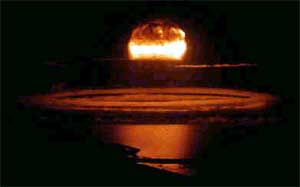 Many of us grew up with nuclear nightmares haunting our sleep. My mother told me in the most fearful possible terms about the American-Cuban missile crisis of 1962 when Nikita Khurshchev of the Soviet Union and President Kennedy stood eyeball to eyeball and brought the world as close to nuclear war as it's ever been. In the 1980s, I joined various nuclear disarmament movements calling upon the successors to Kennedy and Khrushchev to realise the folly of their ways. In a sense, the east-west stand-off ended perfectly, with the demise of Soviet communism and the broadening of the church of liberal democracy to encompass all forms of political thought that embrace freedom.
Many of us grew up with nuclear nightmares haunting our sleep. My mother told me in the most fearful possible terms about the American-Cuban missile crisis of 1962 when Nikita Khurshchev of the Soviet Union and President Kennedy stood eyeball to eyeball and brought the world as close to nuclear war as it's ever been. In the 1980s, I joined various nuclear disarmament movements calling upon the successors to Kennedy and Khrushchev to realise the folly of their ways. In a sense, the east-west stand-off ended perfectly, with the demise of Soviet communism and the broadening of the church of liberal democracy to encompass all forms of political thought that embrace freedom. But those nuclear weapons remained, rusting in their missile silos or submarine launch tubes. And other countries eyed them with envy and determination. Too young to remember the horror of impending war in the early 1960s, I'll never forget the events of May 1998 when both India and Pakistan went overtly nuclear. At the time, India's newly-elected coalition government was mired in political infighting and I continue to believe that there was more than element of domestic politics in Prime Minister Atal Behari Vajapyee's decision to test the country's existing nuclear weapons. Across the Line of Control, an embattled Nawaz Sharif watched with trepidation and took phone call after phone call from Washington, Japan and European capitals. Each voice down the line would outline a more generous offer-a bribe, if you like-of cash, loans and debt relief if Sharif didn't respond to the Indian tests. He considered them all, very, very seriously. But in the end it was impossible for a civilian prime minister-governing on sufferance from a powerful army-to avoid ordering that Pakistan's nuclear arsenal be wheeled out and put through its paces. A Pakistani public celebrated with glee-a grim and horrible mirror of India's own joy at its perceived place at the nuclear top table.
In short, two huge, influential yet poverty-ridden countries committed acts of immense risk and potentially fatal insanity, arguably for domestic political reasons. If nuclear weapons had a moral or military justification at all, it was the Cold War theory that they deterred conventional war and kept each side's dirty tricks within privately agreed parameters. But on the current evidence, nuclear weapons have only heightened tensions in South Asia, increased the dangers inherent in fifty year-old hostilities, made it far more likely that the entire region must suffer when the enemies posture and puff out their chests. If India and Pakistan possessed only conventional weapons, foreign government would not issue travel warnings about distant capital cities and-crucially-neighbouring states. By the way, anyone in Nepal's tourism industry who expects any sort of recovery anytime soon is deluding themselves. The final nail is being driven into the coffin of tourism here by the very existence of Pakistani and Indian nuclear arsenals.
There is a glimmer of something that might-in time-become hope, and it lies in those peace marches of the 1980s that I remember as part of a jaded, faraway youth. Nuclear weapons are not the internal concern of any one country. They respect no borders, their fallout is born by the winds, their victims must be cared for by all of us. Similarly, we have every right, in this region and around the world, to acquaint India and Pakistan with our feelings, to devise regimes of sanctions and punitive actions that might help deter the use of atomic bombs. If America was justified in attacking Afghanistan after 11 September, you could argue that the same international coalition has the right to take whatever measure it can to prevent nuclear war in South Asia, from coercive diplomacy to pre-emptive strikes on nuclear facilities and launch areas. Beyond that, the world must get involved in resolving issues that provoke hostilities, from Pakistan's support for terrorist groups across the Line of Control, to the matter of Kashmir. Citizens of South Asia must put aside petty problems and domestic differences and acquaint the two giants of the region with their feelings. E-mails to governments, letters, rallies and delegations to hostile capitals are good places to start.
The late King Birendra once proposed making this region a Zone of Peace. The time is right to renew that idea with vigour. We must insist that future generations have the right to live in peace, prosperity and freedom from fear.



